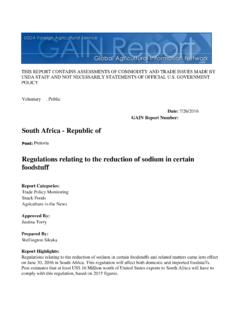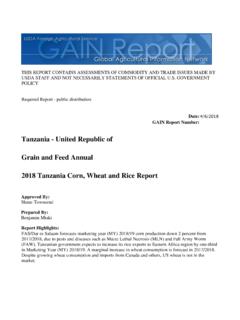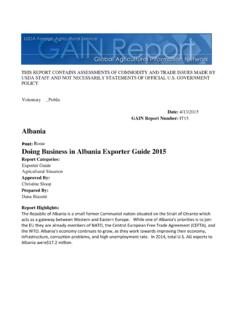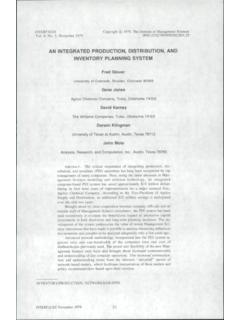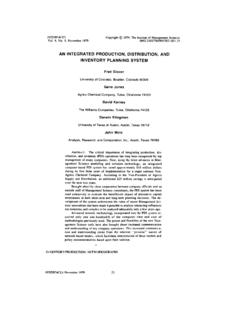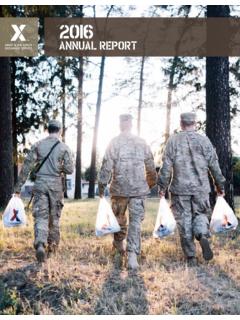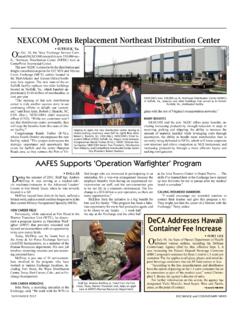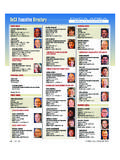Transcription of Venezuela Retail Foods Retail Food Sector - USDA
1 THIS REPORT CONTAINS ASSESSMENTS OF COMMODITY AND TRADE ISSUES MADE BY USDA STAFF AND NOT NECESSARILY STATEMENTS OF OFFICIAL GOVERNMENT POLICY Date: GAIN Report Number: Approved By: Prepared By: Report Highlights: The Retail Sector in Venezuela continues to be an important point of sale for importers. There are 162,054 Retail outlets, including supermarkets (chain and independents), mom & pops, and government-owned stores in Venezuela selling food and beverages. Most Venezuelan supermarkets are modern and offer high-quality service to customers. Imports of consumer-oriented products from the United States grew from US$84 to US$127 million between 2006 and 2010.
2 Jonathan Martinez David W. Cottrell Retail Food Sector Retail Foods Venezuela VE1159 3/1/2012 Required Report - public distribution Post: USA Pavilion at the 16th Annual Americas Food & Beverage Show and Conference Interested in exporting to Venezuela ? Don t forget to come to If you are reading this report because you are interested in exporting to Venezuela , come to the AMERICAS FOOD & BEVERAGE SHOW MIAMI in September 2012. What: 16th Americas Food & Beverage Show and Conference When: September 24-25, 2012 Where: Miami Beach Convention center In 2011 there were 388 booths, 365 exhibiting companies, and more than 7,000 attendees. For more information on how to become an exhibitor in the American Pavilion, click on this link For more information about the show please click on the logo above or this link Caracas SECTION I.
3 MARKET SUMMARY Most of the privately owned supermarkets in Venezuela are controlled by descendants of Portuguese immigrants who came to Venezuela in the 1950 s. At that time, the Sector was characterized by many disparate, small groups of outlets called bodegas or abastos that did not have sophisticated import mechanisms or customer service. However, the Sector has changed significantly since the 1980's, and today most of the supermarkets offer quick, high-quality service to customers. One of the reasons for this change is that the new generation of supermarket owners has attended international trade shows where they learned the latest trends, including technology. Both the public and private sectors are involved in Venezuela s Retail food Sector .
4 In 2003, the Government of Venezuela (BRV) created state-owned food production facilities, a distribution system, and supermarkets. Products offered through the government s network of Retail stores are sold at lower prices than traditional supermarkets, creating competition with the private Sector hypermarkets, supermarkets and small outlets. Most of the major supermarket and hypermarket chains in Venezuela belong to the National Supermarket Association (ANSA). exchange Rate Policy Since early 2003, strict control policies govern and limit transactions with foreign exchange . Currency trading is illegal and all transactions must be approved by the government s Foreign exchange Administration Commission (CADIVI).
5 Importers must register with CADIVI and apply formally for foreign currency transactions. When approved, the transactions are first liquidated through the Central Bank and finally through commercial banks. Currently, the exchange rate is set at Bolivars per one US Dollar. Food Price Controls Since January 2003, the BRV imposed a price control policy on basic food and processed food products. Only the Ministries of Agriculture and Land (MAT); Food (MINAL); and Health and Social Development (MSDS) can recommend changes to the controlled-price list, and include: a) adding or removing products from the list, and b) increasing or decreasing prices of specific food products. Products currently under price control are: rice, oatmeal, corn flour, pasta and bread, beef, chicken and poultry products, sardines and tuna, corn oil, sunflower oil, blended oil, powdered milk, pasteurized milk, milk infant formulas, soy milk, white cheese, margarine, peas, lentils and black beans, refined sugar and brown sugar, tomato sauce, bologna sausage and salt.
6 The list of products under price control and their current prices can change without notice, so exporters should regularly review the situation. A. PUBLIC Sector : FOOD Retail MERCAL Created in April 2003, MERCAL or "Mercado de Alimentos ", markets food products at low prices. The stores sell government-subsided products to the lower economic classes. Products include powdered milk, precooked corn flour, black beans, rice, vegetable oil, sardines, pasta, sugar, bologna, margarine, deviled ham, eggs, mayonnaise and sauces. MERCAL s food distribution web has expanded to 15,743 points of sales that includes mostly small stores (see table 1). The government entity, CASA (Corporaction de Abastecimiento y Servicios Agricolas), is in charge of purchasing domestic and imported food and agricultural products.
7 The prices at MERCAL are lower than the controlled-priced products sold by supermarkets (see table 2). During 2003, imported Foods represented 70 percent of all products offered at MERCAL stores, with the remaining 30 percent sourced locally. Currently, CASA has stated that they import about 60 percent of its food products, with the remaining products purchased locally. Many of the products sold at MERCAL are under CASA s private label Table 1. MERCAL: Format and Numbers FORMATS NUMBER OF VENUES MERCAL I (154 sq mts and larger) Owned by the government 210 MERCAL II (300 sq mts and larger) Owned by the government 1,008 SUPERMERCAL (440 sq mts and larger) Owned by the government 35 MERCALITO (small mom & pop stores) Privately owned (franchised) 13,978 MOVILES (trucks selling products to remote areas) Privately owned (franchised) 394 distribution CENTERS Owned by the government 118 TOTAL 15,743 Source: Mercal s web page, 2011 Table 2.
8 MERCAL Prices vs Controlled Prices Product Package / Size MERCAL Price (Bolivares)* Controlled Prices (Bolivares)* Beef 1 Kilogram Corn Flour 1 kilogram Wheat Flour 1 kilogram Powder Milk 1 kilogram Margarine 500 grams Sugar 1 kilogram Mortadela (bologna) 1 kilogram Pasta 1 kilogram Chicken 1 kilogram Black Beans 1 kilogram Rice 1 kilogram Vegetable Oil 1 liter Lentils 1 kilogram Source: Mercal s web page, 2011. *US$1 = Bolivares State-Owned Enterprises Created in 2004, the Venezuelan Agricultural Corporation (CVA) is a state-holding enterprise, with the following processing subsidiaries: CVA Cereals and Oilseeds; CVA Dairy; CVA Sugar and CVA Inputs.
9 The main objective of the CVA is to supply the state-owned food distribution chain (MERCAL). According to CVA s regulations published in the official gazette, these industries produce pre-cooked corn flour, pastas, milled rice, powdered milk, refined sugar and various agricultural inputs though the establishment of processing plants, and they also entitled to import and export raw and processed food products. In December 2009, the Corporaci n de Mercados Socialistas (COMERSO) was created, to coordinate the commercial distribution programs devised by the Bolivarian Government. The Productora y Distribuidora de Alimentos (PDVAL) administers and supplies the COMERSO chain. In January 2010, after several months of negotiations with majority holders the Bolivarian Government announced the expropriation of the supermarket chain, Supermercados Exito , the French group, Casino , and the Colombian Almacenes Exito.
10 In November 2010, the Government bought 81 percent of the shares of the CATIVEN Supermarket Chain (also owned by the Casino Group). With this acquisition, the Venezuelan government became the owner of 35 stores that were renamed Abastos Bicentenario (formerly Supermercados CADA), six stores of Gran Bicentenario (formerly Hipermercado Exito), eight distribution centers and a trucking fleet. The Bicentenario is controlled by the Socialist Market Corporation (COMERSO). B. PRIVATE Sector : FOOD Retail There are more than 1,500 privately owned supermarkets (both chain and independents) in Venezuela selling food and beverages. There are an additional 159,657 traditional abastos or bodegas (mom & pops), located on nearly every block in Venezuela s cities and towns, especially in middle-and low-income neighborhoods.

